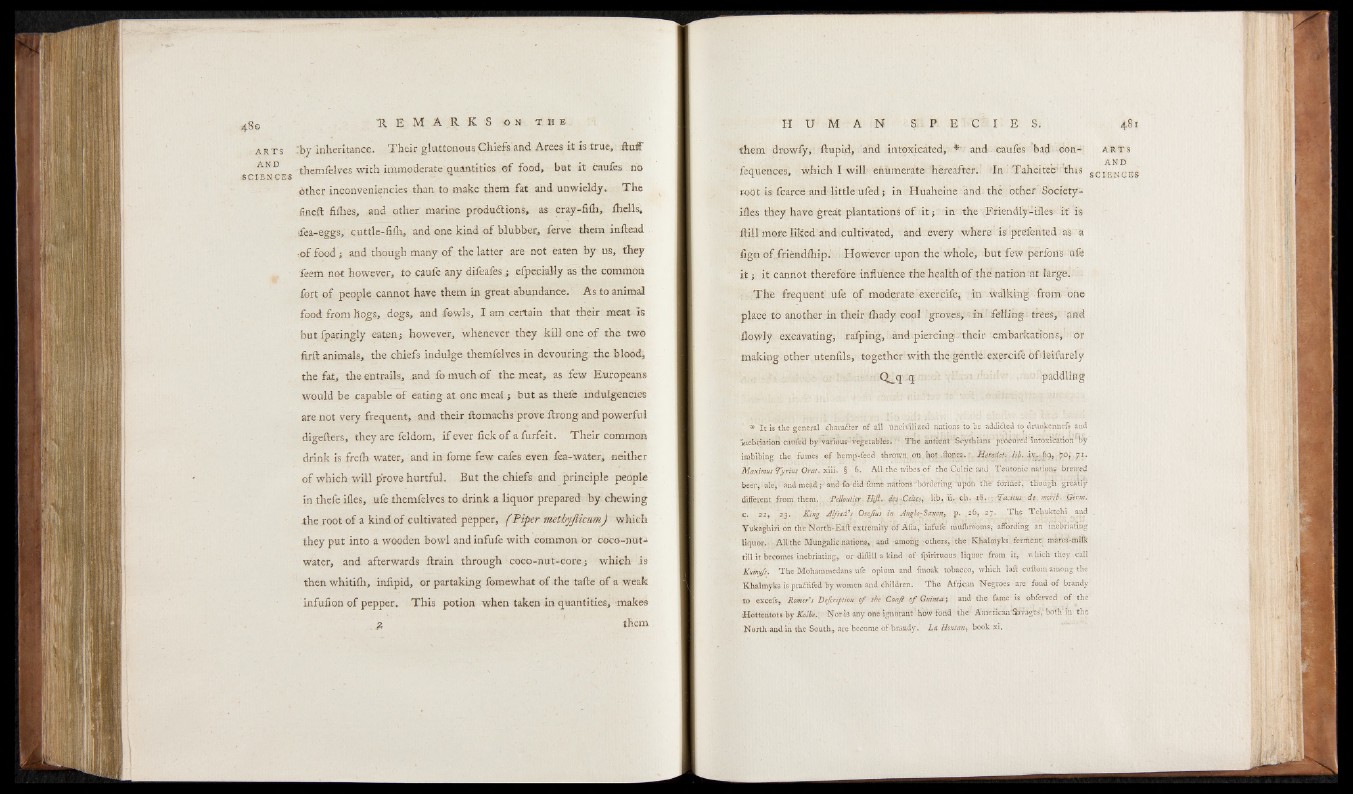
arts :by inheritance. Their gluttonous Chiefs'and Arees it is true, fluff
AND themfelves with immoderate quantities o f food, but it caufes no
■ SCIENCES
other inconveniencies than to make them fat and unwieldy. The
fineft fiflies, and other marine productions, as cray-fiili, fhells,
■ fea-eggs, cuttle-fifh, and one kind o f blubber, ferve them inflead
o f food; and though many o f the latter are not eaten by us, they
feem not however, to caufe any difeafes; efpecially as the common
fort of people cannot have them in great abundance. As to animal
food from hogs, dogs, and -fowls, I am certain that their meat is
but fparingly eaten; however, whenever they kill one o f the two
frrft animals, the chiefs indulge themfelves in devouring the blood,
the fat, the entrails, and fo much o f the meat, as few Europeans
would be capable o f eating at one meal; but as thefe indulgencies
are not very frequent, and their ftomachi prove flrong and powerful
digefters, they are feldom, i f ever tick o f a furfeit. Their common
drink is frefh water, and in fome few cafes even fea-water, neither
of which will prove hurtful. But the chiefs and principle people
in thefe ifles, u£e themfelves to drink a liquor prepared by chewing
the root of a kind of cultivated pepper, ( Piper methyflicum) which
they put into a wooden bowl and infufe with common or coco-nut-1
water, and afterwards ftrain through coco-nut-core; which is
then whitifh, infipid, or partaking fomewhat o f the tafte o f a weak
infufion of pepper. This potion when taken in quantities, makes
2 them
them drowfy, ftupid, and intoxicated, and - caufes bad con- a r t s
. . . . AND
fequences, which I will enumerate'hereafter. Tn Taheitee" this SCI£NCES
root is fcarcé and little ufed ; in Huaheine and th é . other Societyilles
they'have great plantations Of i t ; in the' Friendly-ifles- if is
Hill more liked and cultivated, and every where is prefented as a
lign o f friendlhip. However upon the whole, but few perfons-tife
it ; it cannot therefore influence the health o f the nation at large.
T h e frequent ufe of moderate exercife, in walking from one
place to another in their ihady cool groves, in' felling- trees,'- ‘and
flowly excavating, rafpirig, and.piercing ■ their embarkations,1 or
making other utenfils, together with the .géntlé-exerciiê óflêifürely
Q_q q ' paddling
* I t is the general character of all uncivilized nations to be addiflxd to drunkcnnefs and
inebriation ctiufcU b y various- vegetables. - ■ The antrent'Scythians 'prdcaiedintcni'cation by
imbibing'the fumes of hemp-feed thrown, on hot-liones.: Her ode!. lit. .1^.- 6 9,40, 71.
Maximus Tyrius Oral. xiii. § 6. All the tribes of the Celtic and Teutonic nations brewed
beer, ale,- and m eadand fo did fome nations 'bordering 'tlphh the' fdrrner. though gfeatly
different from them. Pdleulier Hi/}, des .Celtesy. lib. ii, ch. -iS. ; iTaeitus, de. merit:. Qersn.
c. 22, 23. King Alfred's Onjtus in AnSlo:Saxon, p. .=6, 27. The Tcbuktchi and
Yukaghiri on the North-Eaft extremity of Afia, infufe muffirboms; affording an inebriating
liquor. All the Mungalic nations, and among-others, the Khalmyks ferment mares-milk
till it becomes inebriating, or diflill a kind of fpirituous liquor from it, which they call
Kumyfs. The Mohammedans ufe opium and fmoak tobacco, which laft cultoin among the
Khalmyks is pradtifed by women and children. The African Negroes are fond of brandy
to cxcefs, Homer's Description of the Coaji of Guinea; and the fame is obferved of the
■ Hottentots by Kolfo.: Nor is any one ignorant'how fond the AmcricairSavages.' both'in the
North and in the South, are become of brandy. La Hontan, book xi.
H H H